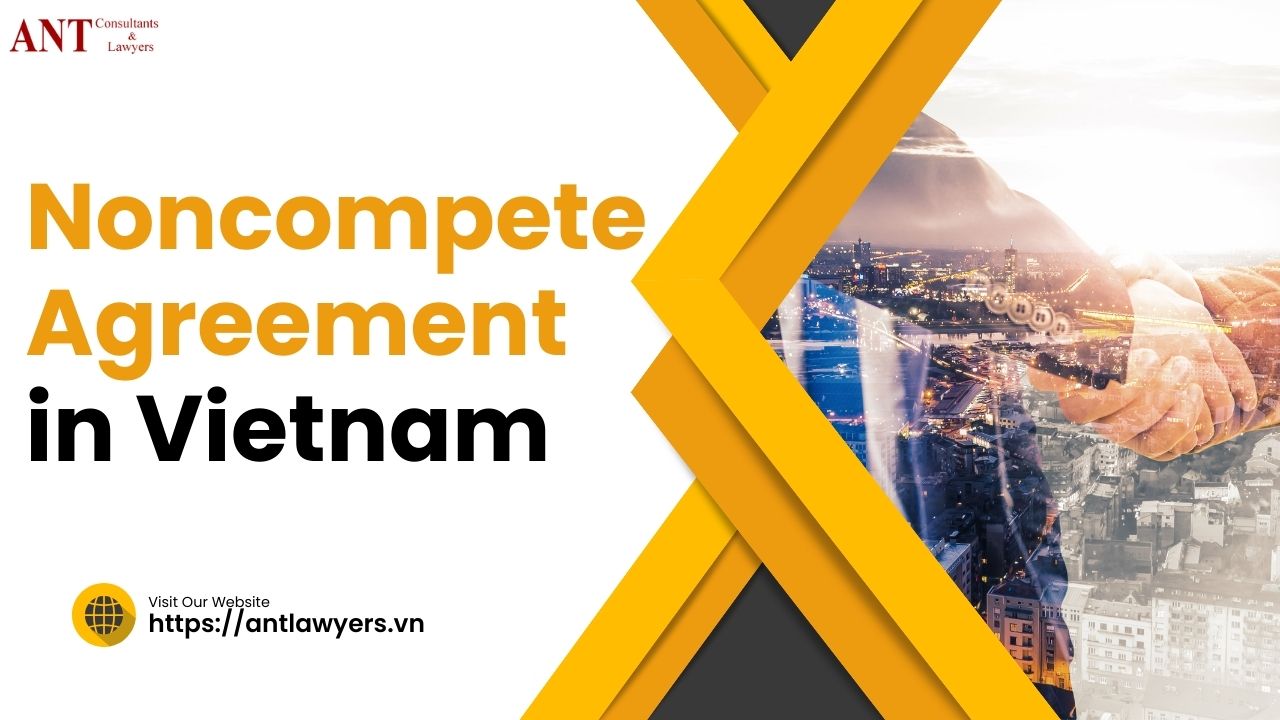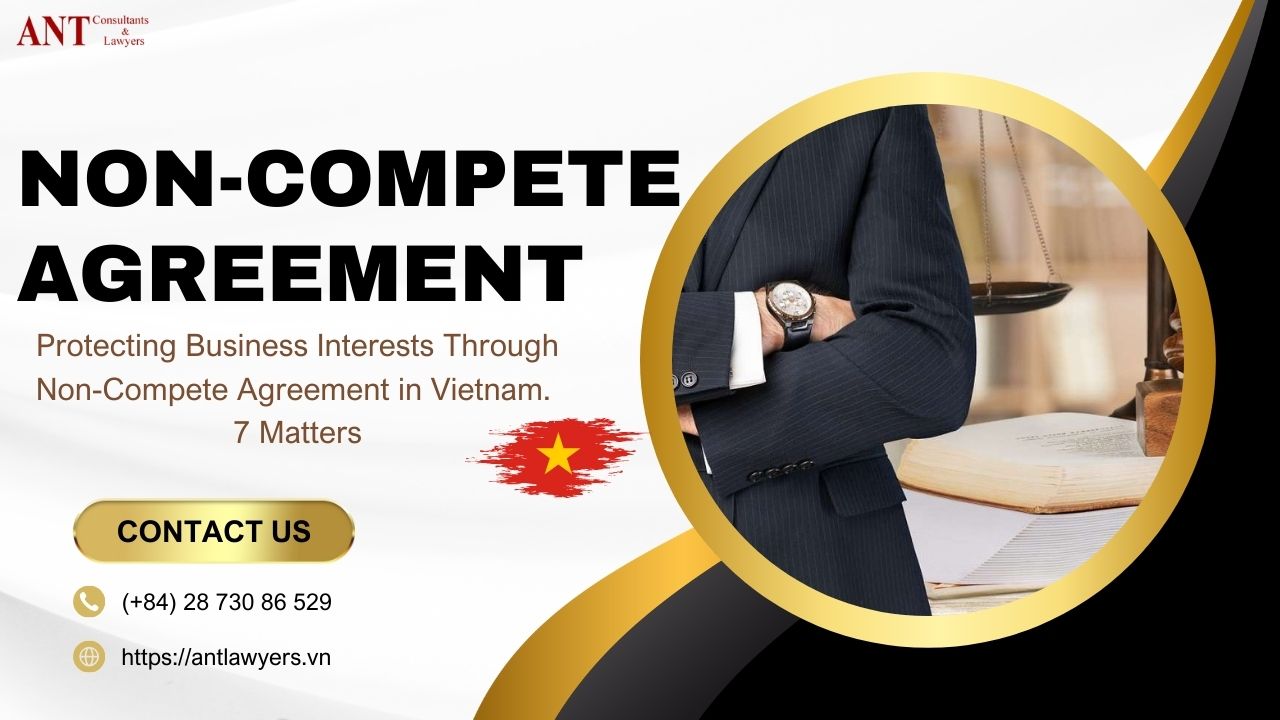Noncompete Agreement in Vietnam: 10 Critical Insights Foreign Businesses Must Know to Avoid Costly Mistakes


For foreign investors and businesses expanding into Vietnam, understanding noncompete agreement in Vietnam is essential to protect business interests while complying with local legal standards. Whether you are hiring local employees, partnering with Vietnamese businesses, or acquiring companies in the region, noncompete clauses play a key role in safeguarding trade secrets, market share, and goodwill.
However, Vietnam’s legal framework surrounding noncompete agreements remains ambiguous and differs significantly from other jurisdictions like the United States or Europe. To navigate this landscape successfully, foreign businesses must be aware of the enforceability, limitations, and legal risks tied to these agreements.
In here we discuss key considerations, practical advice, and potential pitfalls of noncompete agreements in Vietnam for foreign businesses. By addressing critical questions, we aim to provide you with the clarity needed to protect your business interests.
A noncompete agreement in Vietnam is a contractual provision that restricts employees, contractors, or business partners from engaging in competitive activities against an employer or company for a certain period of time after their contract ends.
Unlike other jurisdictions, Vietnam’s Labor Code does not explicitly regulate noncompete agreements. However, these clauses are often included in employment contracts, business partnership agreements, and shareholder agreements to protect trade secrets, client bases, and competitive advantages.
For foreign businesses, this ambiguity poses both opportunities and challenges. Courts may enforce such agreements, but only if they meet certain standards of reasonableness and do not violate Vietnamese public policy.
Are Noncompete Agreements Enforceable in Vietnam?
The enforceability of a noncompete agreement in Vietnam largely depends on the following factors:
- Legal Framework: Vietnam’s Labor Code does not explicitly recognize or regulate noncompete clauses. This lack of regulation means that such agreements are primarily governed by Civil Law principles related to contracts.
- Reasonableness: Vietnamese courts are likely to examine the reasonableness of the agreement, particularly in relation to:
- Geographic scope
- Duration of the restriction
- Compensation provided to the restricted party
- Protectable Interests: Employers must demonstrate a legitimate business interest that justifies imposing a noncompete clause, such as:
- Protecting trade secrets
- Maintaining customer relationships
- Preventing unfair competition
Key Insight: Foreign businesses must draft noncompete agreements carefully to ensure they do not infringe upon an employee’s constitutional right to earn a living, which courts in Vietnam may prioritize.
How Does Vietnamese Law View Noncompete Agreements in Employment Contracts?
While noncompete clauses are not specifically addressed under Vietnamese law, they are often included in employment contracts to prevent employees from joining competitors or starting similar businesses after termination.
However, foreign businesses should consider the following limitations:
- Labor Law Principles: Vietnamese labor laws emphasize the protection of employees’ rights. A restrictive noncompete agreement in Vietnam that excessively limits an employee’s ability to work may be viewed as invalid.
- No Automatic Compensation Obligation: Unlike in some jurisdictions, Vietnamese law does not require employers to pay employees during the restricted period. However, providing compensation increases the likelihood of enforcement in court.
- Judicial Interpretation: Vietnamese courts have shown a tendency to favor employees when interpreting restrictive covenants. Thus, overly broad noncompete clauses may not be enforceable.
What are the Key Elements of a Valid Noncompete Agreement in Vietnam?
To improve the enforceability of a noncompete agreement in Vietnam, foreign businesses must ensure that the clause meets the following criteria:
- Reasonable Scope and Duration:
- The geographic area covered must be limited to where the business operates.
- The duration of the restriction should be reasonable (typically 6-12 months). Clauses exceeding 2 years may be deemed unreasonable.
- Clear and Specific Language:
- The agreement must clearly define restricted activities and competitive businesses to avoid ambiguity.
- Legitimate Business Interest:
- Employers must prove that the noncompete protects a legitimate interest, such as trade secrets, intellectual property, or sensitive client information.
- Fair Compensation:
- Providing financial compensation to employees during the restricted period strengthens the enforceability of the agreement.
Practical Tip: Employers should tailor noncompete clauses to specific roles and risks. Blanket restrictions may be viewed as punitive and unenforceable.
Are Noncompete Agreements in Vietnam Applicable to Business Partners?
Foreign businesses often use noncompete agreements in Vietnam to protect interests during business partnerships, joint ventures, or shareholder agreements.
In this context, noncompete clauses are generally more enforceable, as they fall under Vietnam’s Civil Code governing contracts and commercial agreements. Unlike employment relationships, courts may view restrictions on partners or shareholders more favorably, as they are presumed to have equal bargaining power.
Key considerations include:
- Ensuring the clause does not violate public policy or fair competition laws.
- Clearly defining what constitutes “competition” and specifying the duration of the restriction.
How Do Noncompete Agreements Relate to Trade Secrets in Vietnam?
Vietnamese law provides specific protections for trade secrets under the Intellectual Property Law and the Law on Competition.
Foreign businesses can use noncompete agreements in Vietnam as an additional measure to prevent former employees or partners from disclosing trade secrets or using proprietary information to compete unfairly.
However, businesses must:
- Clearly define what constitutes a trade secret in the agreement.
- Combine noncompete clauses with confidentiality agreements for added protection.
Can Noncompete Agreements Be Challenged in Court?
Yes, parties subject to a noncompete agreement in Vietnam can challenge its validity in court on the following grounds:
- The agreement is overly broad or unreasonable in scope, duration, or geographic coverage.
- The agreement infringes on the constitutional right to work.
- The employer cannot demonstrate a legitimate business interest.
Vietnamese courts tend to favor employees when interpreting labor-related disputes. Therefore, employers bear the burden of proving that the noncompete clause is fair and necessary.
How Do Noncompete Agreements Differ for Foreign Employees in Vietnam?
For foreign employees working in Vietnam, noncompete agreements may be more enforceable because:
- They are often part of high-level management or technical positions where trade secrets are involved.
- Compensation during the restricted period is more common for foreign employees.
However, employers must ensure that the agreement complies with Vietnamese law and cannot rely solely on home-country legal principles.
What Are the Consequences of Violating a Noncompete Agreement in Vietnam?
If a party breaches a noncompete agreement in Vietnam, the injured party can seek remedies, including:
- Injunctions: The court may issue an order to stop the violator from engaging in competitive activities.
- Monetary Damages: The injured party can claim compensation for losses resulting from the breach.
- Termination of Agreements: Violations of noncompete clauses in partnership agreements may lead to termination and additional penalties.
Practical Tips for Foreign Businesses Drafting Noncompete Agreements in Vietnam
To maximize the enforceability and effectiveness of a noncompete agreement in Vietnam, foreign businesses should:
- Conduct Risk Assessments: Identify key positions and partners where noncompete clauses are necessary.
- Draft Narrow, Specific Agreements: Avoid overly broad restrictions that courts may view as unfair.
- Provide Fair Compensation: Offering financial compensation during the restricted period enhances enforceability.
- Combine with Confidentiality Agreements: Use additional clauses to protect trade secrets and sensitive information.
- Consult Local Legal Experts: Work with Vietnamese lawyers to ensure compliance with local laws and judicial trends.
For foreign businesses operating in Vietnam, noncompete agreements are a valuable tool for protecting trade secrets, competitive advantages, and business relationships. However, the legal landscape surrounding noncompete agreements in Vietnam is nuanced, with enforceability depending on the reasonableness, clarity, and fairness of the clause.
By understanding the limitations, drafting agreements carefully, and consulting legal experts, foreign businesses can effectively navigate these challenges and protect their interests in Vietnam’s dynamic business environment.
If you are considering implementing a noncompete agreement in Vietnam, taking proactive steps to ensure compliance and fairness will help you avoid costly disputes while safeguarding your business assets.
About ANT Lawyers, a Law Firm in Vietnam
We help clients overcome cultural barriers and achieve their strategic and financial outcomes, while ensuring the best interest rate protection, risk mitigation and regulatory compliance. ANT lawyers has lawyers in Ho Chi Minh city, Hanoi, and Danang, and will help customers in doing business in Vietnam.
How ANT Lawyers Could Help Your Business?
You could reach ANT Lawyers in Vietnam for advice via email ant@antlawyers.vn or call our office at (+84) 24 730 86 529
Recent Posts
7 Essential Truths to Open an Indirect Investment Account in Vietnam and Grow with Confidence
Do you want to invest overseas into Vietnam? Do you want to open an indirect…
5 Crucial Facts About ESG Laws in Vietnam That Could Save Your Business and Reputation
The Business World Is Changing Fast Rules are shifting. Expectations are rising. Eyes are watching. …
7 Powerful Reasons Why ESG Compliance in Vietnam Will Win You Trust, Growth, and Global Clients
Trust matters. Today, more than ever. Across industries, many companies are now being asked. directly…
7 Bold Reasons Why Tokenization in Vietnam Could Transform Your Future
Change is coming. Quietly. Digitally. Rapidly. Let’s imagine the situation, which assets are no longer…
Vietnam P2P Lending: 5 Bold Reasons Why Decree 94/2025 Could Empower Millions or Backfire?
A New Financial Chapter Begins in Vietnam One person lends. Another borrows. It’s that simple.…
5 Essential Lessons from Risk Management in Digital Assets in Vietnam: Protecting Trust in a Digital World
Trust Is the Real Currency Money can be lost. Tokens can vanish. Platforms can crash.…




